 Petzlover
Petzlover Doxiepoo is originated from United States but Japanese Terrier is originated from Japan. Doxiepoo may grow 8 cm / 3 inches shorter than Japanese Terrier. Both Doxiepoo and Japanese Terrier are having almost same weight. Both Doxiepoo and Japanese Terrier has same life span. Both Doxiepoo and Japanese Terrier has almost same litter size. Doxiepoo requires Moderate Maintenance. But Japanese Terrier requires Low Maintenance
Doxiepoo is originated from United States but Japanese Terrier is originated from Japan. Doxiepoo may grow 8 cm / 3 inches shorter than Japanese Terrier. Both Doxiepoo and Japanese Terrier are having almost same weight. Both Doxiepoo and Japanese Terrier has same life span. Both Doxiepoo and Japanese Terrier has almost same litter size. Doxiepoo requires Moderate Maintenance. But Japanese Terrier requires Low Maintenance
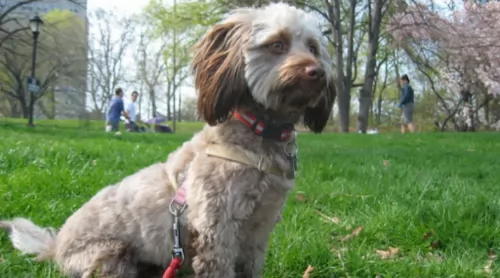 The Doxiepoo is a designer dog breed - a combination of the Dachshund who was used to hunt for Badgers and the Poodle, a dog bred in France to essentially be a lap dog. There is however some dispute as to whether the Poodle descends from Germany or from the French Barbet.
The Doxiepoo is a designer dog breed - a combination of the Dachshund who was used to hunt for Badgers and the Poodle, a dog bred in France to essentially be a lap dog. There is however some dispute as to whether the Poodle descends from Germany or from the French Barbet.
Wherever the parents hail from, the Doxiepoo hails from the United States of America.
With both the Poodle and the Dachshund being intelligent, fun and loving type of canines, the two of them together have brought out a wonderful hybrid pet in the Doxiepoo. Today, the Doxiepoo is bred with other Doxiepoos.
 The Japanese Terrier is native to Japan and is a rare pure bred dog. It is believed that the dog comes from Smooth Fox Terriers who arrived way back in the 17th century.
The Japanese Terrier is native to Japan and is a rare pure bred dog. It is believed that the dog comes from Smooth Fox Terriers who arrived way back in the 17th century.
Certainly he looks very much like a regular Fox Terrier. It is thought that these smooth Fox Terriers were then interbred with local, Japanese dogs and used to hunt rats. Gradually he became a lap dog and companion.
Planned breeding of the dog began in 1920, and it was in 1930 that the dog was admitted to the Japanese Kennel Club with a breeding program being started.
Today you will find the Japanese Terrier in his home country and small numbers elsewhere. He was admitted to the United Kennel Club in 2006.
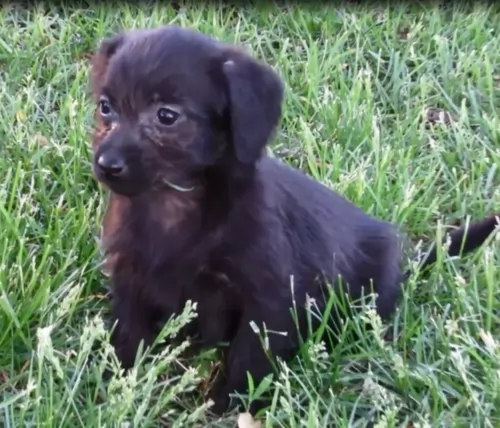 The Doxiepoo can range from being a small to medium sized dog, standing at anything between 20cm to 25cm in size and weighing between 3kg and 7kg, depending much on whether a standard, miniature or toy sized poodle was used in the breeding.
The Doxiepoo can range from being a small to medium sized dog, standing at anything between 20cm to 25cm in size and weighing between 3kg and 7kg, depending much on whether a standard, miniature or toy sized poodle was used in the breeding.
The Doxiepoo could look like either one of the two breeds, but he will have a strong, sturdy body with a curly or wavy coat of varying lengths and various colors - cream, black, tan, apricot, grey or white. The poodle side of him ensures he is a hypoallergenic dog.
Between the Dachshund and the Poodle, you’re going to get a wonderful array of characteristics as they both come with their strong points. Certainly you will be well entertained and amused by your pet, while he can also be useful as a watchdog.
Being a small dog, he will fit well into life in the city or in the countryside. He is as bright as a button and learns tricks and new skills quickly. With training and socialization he becomes obedient and well behaved wherever he is, getting on well with other pets in the home as well as with all children and adults.
The Doxiepoo is a lively, alert, energetic dog and will require being exercised – lots of ball games and a walk will keep him lean, muscular and content.
 The Japanese Terrier is a small sized dog who stands at 20 – 33cm at the shoulders and weighs in at about 2 to 5kg.
The Japanese Terrier is a small sized dog who stands at 20 – 33cm at the shoulders and weighs in at about 2 to 5kg.
He is a short, smooth haired dog with a tight skin and in colors of white and black. Sometimes you may find a little bit of tan color on the face too as well as 'freckles' around the neck area and legs. The black shading of the coat is essentially found around the head of the dog and also his ears.
His ears are set high on the head and are semi-erect, semi-floppy. The tail has always been traditionally docked, giving the dog a nice compact look but these days it is unfortunately often left long and then its a medium length tail which is thinly covered in short hair. The nose is black and the eye are brown, bright and alert.
Gentle, cheerful, intelligent, loving and loyal are some of the characteristics of the Japanese Terrier. People who have kept him as a pet will vouch for him being a wonderful companion.
He is an active dog, but he still loves to be petted and won’t do well if left alone and not part of his human family. Being a clever dog, he is easy to train, learning easily and quickly. He is quite amusing at times and you can even teach him some tricks.
He gets on well with other pets in the home as well as with children. He is alert and will make a good watchdog, alerting you to an intruder.
Because of the Japanese Terrier’s small size and sensitive nature, this breed needs a calm owner and a quiet household. It is not recommended for boisterous households.
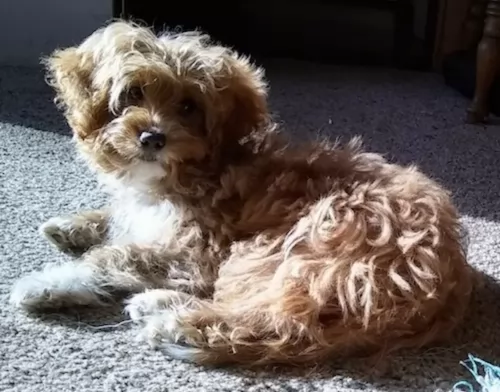 Every dog, even the little ones like this, will require some kind of input from you if you want to get the best from him. Every puppy bought as a gift when they’re cute and cuddly turns into an adult, and often the very person who received him as a gift, loses interest and neglects him. Then they wonder why the dog becomes irritating and destructive.
Every dog, even the little ones like this, will require some kind of input from you if you want to get the best from him. Every puppy bought as a gift when they’re cute and cuddly turns into an adult, and often the very person who received him as a gift, loses interest and neglects him. Then they wonder why the dog becomes irritating and destructive.
A dog is a long term investment and if you commit to your sweet Doxiepoo, you’ll get years and years of devoted friendship.
 As a pet of yours, the Japanese Terrier is an animated, contented little dog. He loves playing games and gets on well with children who aren't rough and disrespectful of him.
As a pet of yours, the Japanese Terrier is an animated, contented little dog. He loves playing games and gets on well with children who aren't rough and disrespectful of him.
He is smart and gentle and loves nothing more than to sit on your lap in the evenings and be your reading- or watching-TV companion. Give him the right amount of attention as any other family member receives and he is guaranteed to make you an excellent, low maintenance pet.
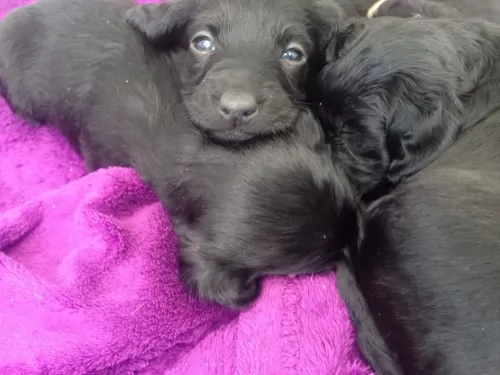 The life expectancy of the Doxiepoo is around 12-15 years of age if he is well looked after. He is a robust dog, but he can still face some health issues that both his parents contend with.
The life expectancy of the Doxiepoo is around 12-15 years of age if he is well looked after. He is a robust dog, but he can still face some health issues that both his parents contend with.
Just some of the diseases that the Doxiepoo might face while in your care are ear- and skin infections, dental disease, digestive tract problems, heart conditions and epilepsy. If you think your pet has any kind of illness, it is imperative to get him to the vet for a checkup.
Poodles, particularly are prone to skin disorders. They can be allergic to grass, parasites and food. If your Doxiepoo chews or licks his paws or some other area a lot, and the skin is red, he could have a skin allergy.
The vet will be able to diagnose your dog’s allergies with some skin- or blood testing. For instance, sebaceous adenitis is an inherited allergy that affects the lubrication of the skin and hair follicles. Symptoms of the disease include scaly skin, sore and even hair loss.
 The Japanese Terrier has no particular health issues and has a lifespan of 12 – 15 years if looked after well.
The Japanese Terrier has no particular health issues and has a lifespan of 12 – 15 years if looked after well.
There are always one or two illnesses to watch out for such as eye- and ear infections. Some dogs also develop conditions such as Patella Luxation. This happens when your dog's kneecap is dislocated. It can only be returned to its normal position when certain muscles in the back legs are relaxed and lengthened.
With this condition, your dog holds up one of his hind legs. This condition is more prevalent in small dog breeds.
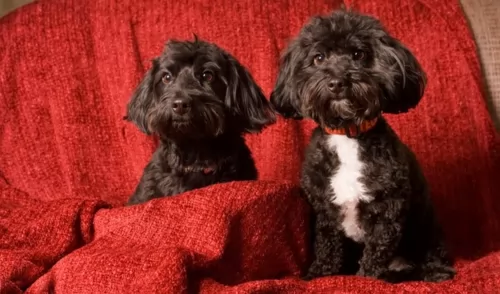 You can’t be sure what kind of coat your Doxiepoo will have but he will certainly require brushing at least twice a week. In some instances it may be wise to seek out the services of a professional groomer who does an excellent job of trimming the hair, cleaning the teeth, checking the ears and clipping the nails.
You can’t be sure what kind of coat your Doxiepoo will have but he will certainly require brushing at least twice a week. In some instances it may be wise to seek out the services of a professional groomer who does an excellent job of trimming the hair, cleaning the teeth, checking the ears and clipping the nails.
The Doxiepoo, just like any other dog, will need to be trained and socialized early as he is a stubborn dog and will need to be trained to be obedient. With this training and socialization, he becomes amicable around children and pets in the home. He learns easily too and this is what makes him a great pet for first time dog owners.
The Doxiepoo is a moderate energy dog, so he will do well on a walk every day. You can also make use of ropes, balls and frisbees to give him a bit of a workout in the garden.
He loves water too and will enjoy a run on the beach and cooling off in the ocean. He adapts easily to life in the city or in the country, so long as he is with his human companions.
The Doxiepoo will eat dry kibble, particularly if it is from the highest quality brands and chosen according to the dog’s size, age and activity levels.
Now and then you can add in a little bit of cooked rice, vegetables and chicken for variety. Some raw meat can play an important role in keeping the skin healthy and free from dryness and itchiness. Make sure that he always has fresh, cool water available to him.
 The Japanese Terrier is an active dog and will require exercise every day. He’ll love to join you on your walks or have ball games in your garden. He can adapt to life in the city or in the country but will always need to have good exercise.
The Japanese Terrier is an active dog and will require exercise every day. He’ll love to join you on your walks or have ball games in your garden. He can adapt to life in the city or in the country but will always need to have good exercise.
The Japanese Terrier is a medium shedder and you want to be sure then to brush him twice a week to get rid of all those loose hairs.
The Japanese Terriers will require the best commercially manufactured dog food, and instead of one large meal a day, rather feed him 2 smaller meals. You can mix some tasty home-made food into his dry kibble from time to time. Excellent home-made food would be something like cooked chicken, brown rice or pasta and some vegetables.
If you can, try to also include some raw meat occasionally. If you’re in any doubt as to how to feed your Japanese Terrier so that he remains healthy, speak to your veterinarian.
Your dog should never ever be without a continuous supply of fresh, cool drinking water.